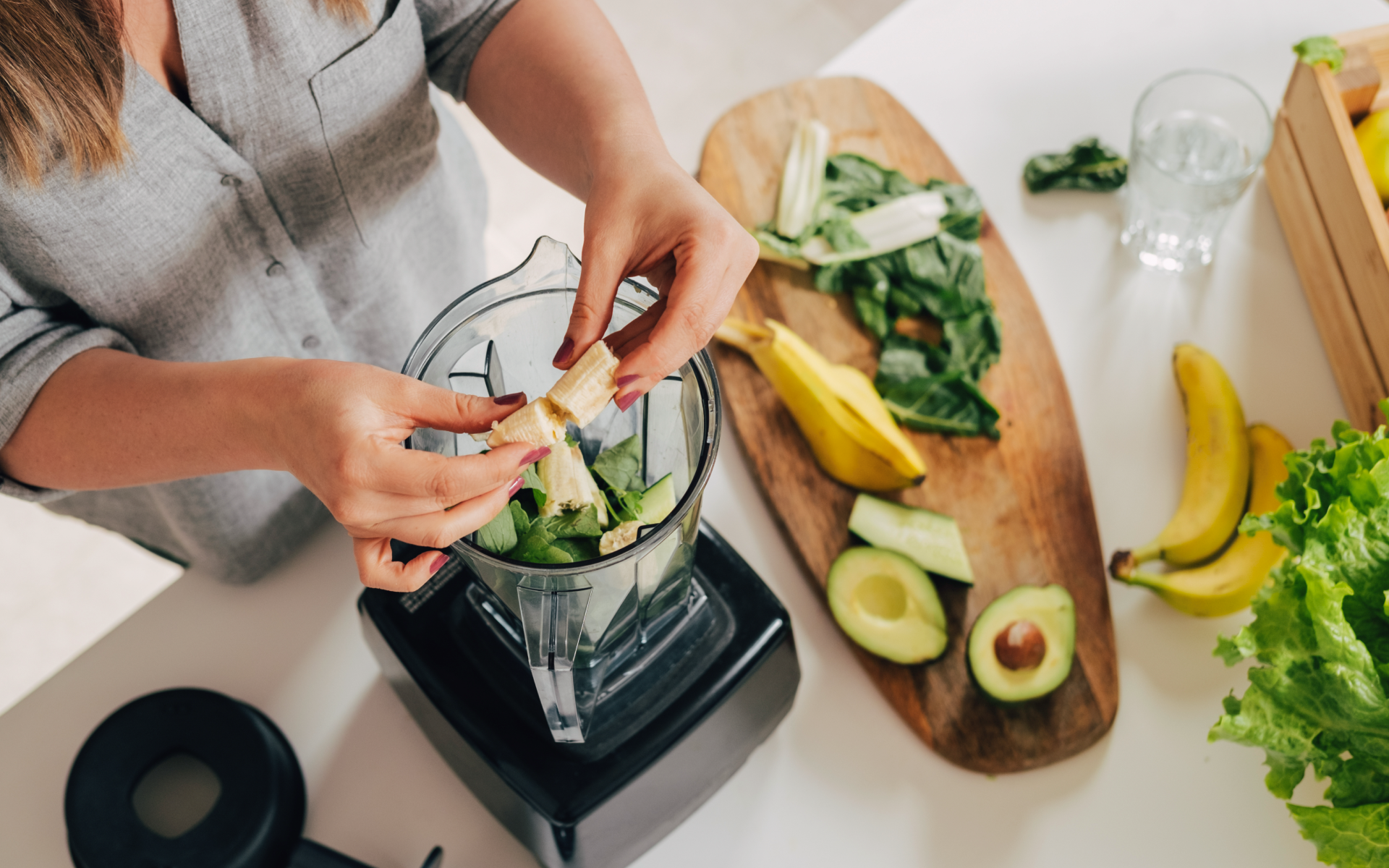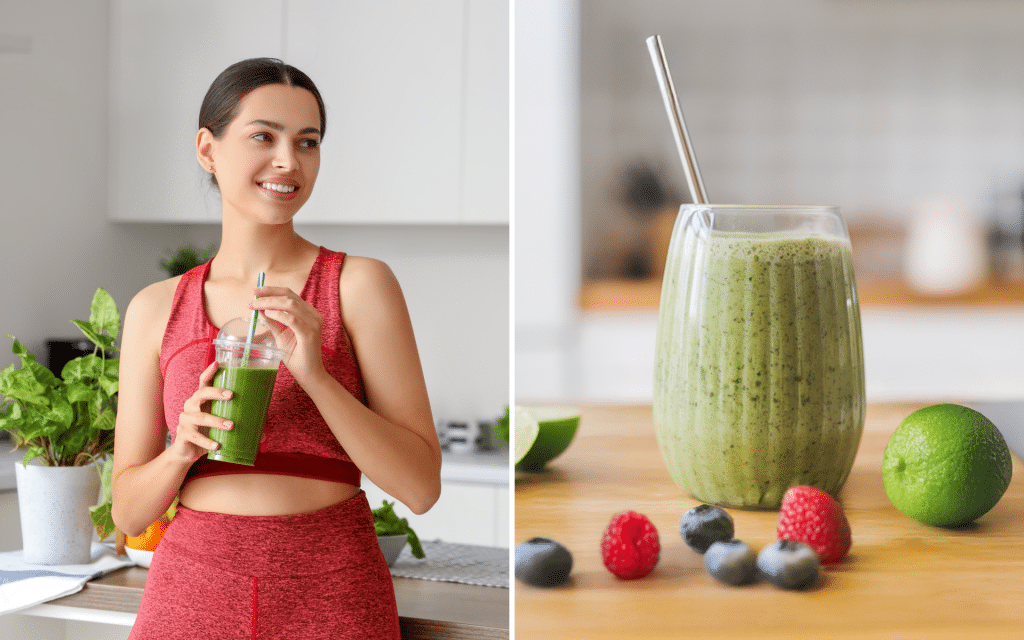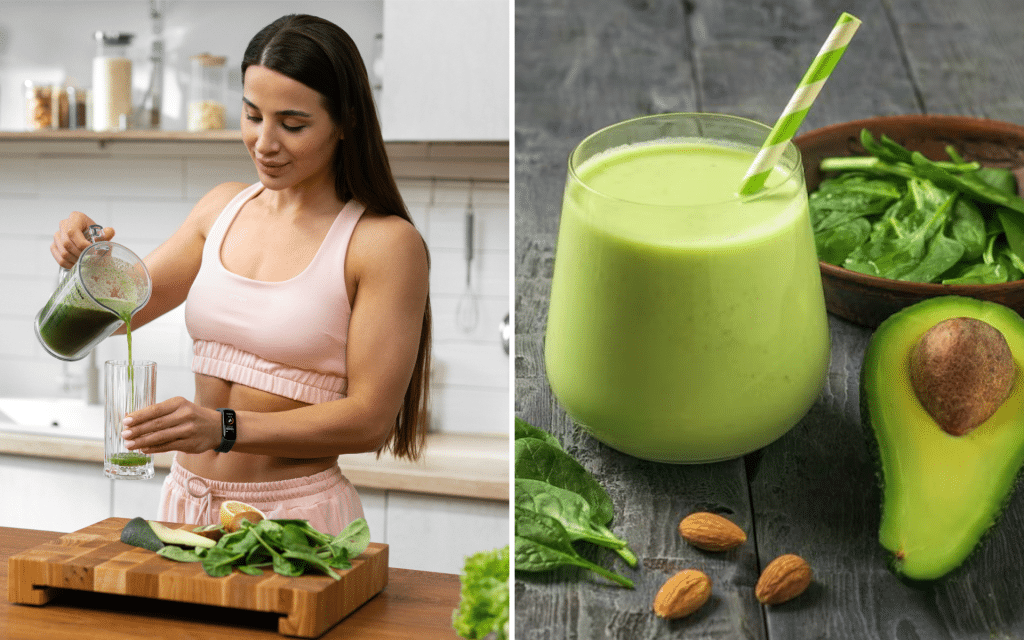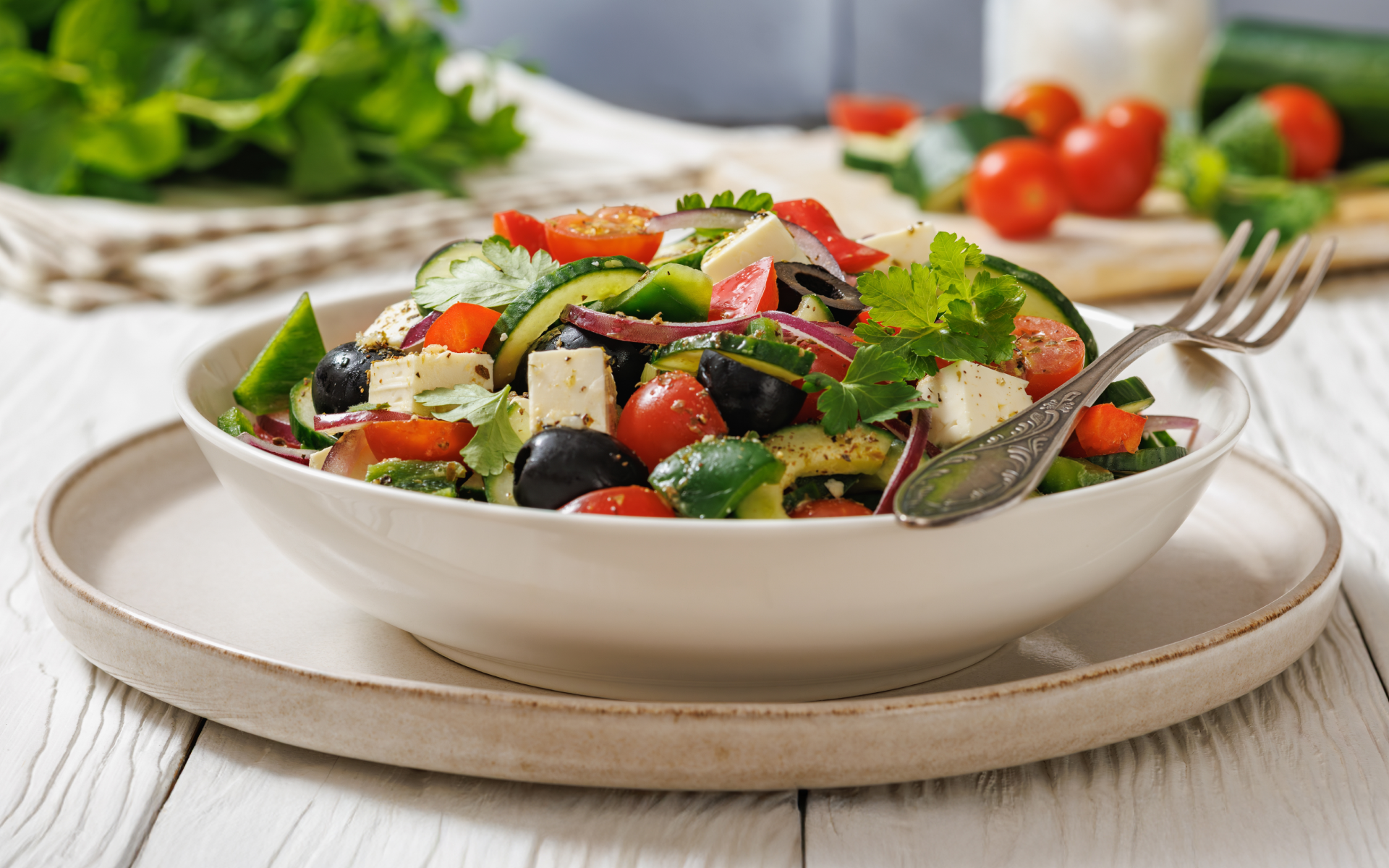A 5-day detox always seems like a good idea when summer’s just around the corner and you need to look amazing in a bikini. But before you jump into a trendy juicing diet that promises to detoxify your body and burn fat, there’s something you need to know.
You can’t detox your own body, as it does that on its own. In addition, a juice fast won’t have long-lasting results. The good news is you can think of the detox as a sane way to revamp your eating habits and get started on healthy foods that’ll move your scale in the right direction.
Read on to find out how.
What Is a Detox?
A detox is the removal of harmful substances from the body. These are generally found in foods or environmental pollutants and are considered negative as they can cause problems for your health (1).
The idea behind a diet detox is to remove these toxins from your body through methods such as drinking lots of water, juice, or fasting. Many times people refer to this kind of diet as a “cleanse” (2). However, in reality, the only thing that drinking a lot of liquids will do is make you go to the toilet more than you should.
The idea behind a detox or cleanse is that it will help you get rid of toxins and lose weight, but this isn’t true for several reasons.
The most important thing is when you lose weight through cleanses, you’re just losing water and/or lean muscle tissue. The actual fat loss rate is quite minimal (3). So, even if toxins were stored in the fat cells, going on a cleanse wouldn’t result in detoxification.
When you don’t eat very many calories, which usually happens because it’s part of the diet plan, your body perceives this to be a form of starvation. It then signals your body to slow down and start holding onto its nutrients and energy reserves. This is why people who do these kinds of diets often feel tired and sluggish. Your body is slowing down as it’s trying to act like you’re in a famine (4).
5 days of an extreme calorie deficit won’t have permanent results, particularly when you go back to eating regular meals. Extreme restriction can make cravings stronger and you’re more likely to overeat. Furthermore, crash diets can trigger an unhealthy relationship with food and result in disordered eating (5).
So what should you do if you want to kickstart your weight loss plan? The answer is simple – forget about detox diets that promise fast results in five days or less. Instead of aiming for rapid fat loss through starvation, which means losing water and lean muscle tissue, you should aim for slow but steady fat loss.
How Do You Know if Your Body Is Full of Toxins?
While the body is generally efficient at detoxification, certain factors such as poor diet, exposure to environmental pollutants, and impaired organ function can hinder this process. Some potential signs that may suggest a buildup of toxins include:
- Fatigue: Persistent tiredness despite adequate rest can indicate that the body is working overtime to eliminate toxins.
- Headaches: Frequent headaches can be related to environmental toxins or dietary factors.
- Skin Issues: Conditions such as acne, rashes, and eczema may be linked to toxin buildup, as the skin is a secondary detoxification organ.
- Digestive Problems: Symptoms such as bloating, constipation, or diarrhea may suggest that the digestive system is struggling to eliminate waste.
- Body Odor and Bad Breath: These can be signs that your body is having difficulty processing toxins effectively.
It’s important to note that these symptoms can also be related to numerous other health conditions. Therefore, experiencing them doesn’t definitively indicate toxin overload. For accurate diagnosis and treatment, it’s essential to consult a healthcare professional as they can perform tests to assess organ function and determine whether toxins are affecting your health.
If you wish to free yourself from all the extra pounds that have been weighing you down for way too long, start using the BetterMe: Health Coaching app and overhaul your entire life!
How Do I Prepare for a 5-Day Cleanse?
Before you start any cleanse, it’s important to consult a healthcare professional. They can provide personalized advice based on your health history and ensure the cleanse won’t interfere with any medical conditions or medications.
In the days leading up to the cleanse, start reducing your intake of processed foods, sugar, caffeine, and alcohol. Focus on incorporating more fruits, vegetables, whole grains, and lean proteins into your diet. This gradual shift can help your body adapt and minimize potential withdrawal symptoms. In addition, drink plenty of water to help flush out toxins and keep your body hydrated (6).
During the cleanse, continue prioritizing hydration by drinking a lot of water and herbal teas. Incorporate detoxifying foods such as leafy greens, cruciferous vegetables, berries, and citrus fruits into your meals. Avoid processed and high-fat foods as they can be taxing on the digestive system. Instead, opt for whole foods that are rich in nutrients and fiber to help support detoxification (6).
Engaging in light exercise during the cleanse can also help with toxin elimination by stimulating blood flow and promoting sweating (7). Activities such as yoga, walking, or swimming are great options.
Lastly, make sure you get enough rest and sleep. Detoxification can be tiring for the body, so it’s essential to give it enough time to rest and recover. Consider incorporating relaxation techniques such as meditation or deep breathing into your daily routine.
Read more: How to Stay in Shape: Tips For Long-Term Health
Can You Eat on a 5-Day Cleanse?
During a 5-day cleanse, it’s possible and often recommended to include certain foods that support the body’s natural detoxification processes. While some cleanses may promote fasting or liquid-only diets, others allow for solid foods that can help maintain balanced nutrition.
We recommend using a 5-day cleanse as a reset for your body, rather than a strict diet. This means incorporating whole, nutrient-dense foods such as fruits, vegetables, nuts, seeds, and lean proteins into your meals. These foods provide essential vitamins and minerals that can support the body’s detoxification systems and promote overall health.
How to Detox Without Going on a Juice Fast
Instead of a liquid crash diet, think of a detox as a meal reset program. This means getting rid of all the junk you’ve been eating that’s been causing bloating and sluggishness and putting your health at risk and eating delicious, wholesome meals that will leave you more energized (8).
The foods you’ll stay away from on this 5-day detox cleanse diet plan include:
- Refined sugar
- Gluten
- Saturated fats
- Trans fats
- Processed foods
- Starchy carbs (bread, rice)
- Soda/Coffee
Instead, you’ll be eating:
- Glycine-rich lean protein sources (to your heart’s content!)
Meat, chicken, and eggs are proteins that are rich in glycine. Fish such as tuna and salmon is another source of this amino acid. Protein helps reduce sugar cravings, which often come from carb withdrawal, keeps your blood sugar stable, provides satiety after meals so you’re not tempted to snack, and helps boost immunity throughout the detox period (9).
- Fatty acids found in olive oil or coconut oil
Shaking up your diet from heavy meats and proteins makes room for a more balanced intake of fats, which are major components of cell membranes and are necessary for proper hormone production (10). Frying with quality oils will allow you to add flavor back into your food without all the unwanted side effects. The best part? This means ditching canola and vegetable oil in favor of real unsaturated fats, also known as heart-healthy fats.
- Raw vegetables
Vegetables provide that much-needed crunch factor in our lives. In addition to being delicious “fast food”, they also release energy slowly and stay with you longer than most foods, which means your body doesn’t have to work hard to digest them.
- Ginseng and green tea
These two super foods help detoxify your body by supporting organ functions such as the liver and kidneys (11). A cup of ginseng tea or a shot of ginseng extract is also said to help curb sugar cravings.
- Gluten-free whole grains (in moderation)
Brown rice, quinoa, and millet are all gluten-free carbohydrates that will keep your appetite at bay while you’re detoxing.
- Eggs
Ditch the yolk and enjoy the egg whites instead. Egg whites contain zero fat and almost no calories, so they’ll be great for people who need to watch their calorie intake during a detox (12).
Sample of a 5-Day Detox Diet Meal Plan
Here’s a sample detox diet weight loss 5-day plan. You can easily arrange your daily menu by switching out specific recipes to suit your tastes, diet restrictions, and food availability. For example, you can always substitute grilled tuna with any other type of fish (or a protein-rich chicken breast if you’re not fond of fish). Remember that meal planning is essential as it ensures variety and better diet quality (13).
Day One
- Breakfast: Scrambled eggs with fresh cheese
- Lunch: Chicken salad made from grilled chicken thighs and vegetables with olive oil dressing
- Dinner: Bone-in chicken with a side of quinoa
Day Two
- Breakfast: Scrambled egg whites with fresh cheese and spinach
- Lunch: Steamed salmon served on top of a salad made from cucumber slices, red pepper chunks, arugula leaves, and olive oil dressing (you can add some turkey or ham cubes for added protein content if you wish)
- Dinner: Grilled steak with spiralized zucchini
BetterMe is your fast-track ticket to long-lasting weight loss! Tailor your fitness journey and maximize your results with just a couple of swipes!
Day Three
- Breakfast: Overnight oats topped with banana slices
- Lunch: Chicken salad with sunflower seeds, avocado, and vinaigrette dressing
- Dinner: Steamed fish filet with a side salad made from cucumber slices, tomato chunks, olives, olive oil dressing, and fresh cheese
Day Four
- Breakfast: Scrambled egg whites with fresh cheese, spinach, and cauliflower
- Lunch: Grilled tuna steak with sauteed onions, peppers, carrots, and tomatoes
- Dinner: Grilled steak with a side of brown rice or quinoa topped with olive oil dressing (you can add a cup of chopped cucumber for some crunch)
Day Five
- Breakfast: Scrambled egg whites with fresh cheese and sauteed peppers
- Lunch: Salad made from whole-grain quinoa, red peppers, black olives, tomato chunks, olive oil dressing, and tuna cubes
- Dinner: Salmon in lemon sauce with sauteed mushrooms and rosemary (you can use your preferred fish instead)
Read more: Clean Eating Challenge: A Simple Guide To Kickstart Your Journey
How to Know if a Detox Is Working
Detoxification is not a one-time event, but an ongoing process. Therefore, it may be challenging to pinpoint exactly when your body has completed its detoxification process.
However, there are certain signs that can indicate your detox is working effectively:
- Increased Energy: As the body eliminates toxins and waste products, you may experience a boost in energy levels.
- Clearer Skin: The skin is a secondary organ of detoxification, so as toxins leave the body, the appearance of your skin may improve.
- Better Digestion: Eliminating processed foods and incorporating whole foods into your diet can promote better digestion and elimination.
- Improved Mood: Many people report feeling calmer, more focused, and happier after completing a detox.
We’ve discussed Natural Detox in detail, highlighting the practical steps of incorporating hydration, exercise, and nutrient-rich foods into your daily routine.
Frequently Asked Questions
Does a 5-day detox make you lose weight?
A 5-day detox may lead to temporary weight loss primarily due to reduced calorie intake and water loss, rather than fat loss. It’s important to remember that sustainable weight loss typically involves long-term lifestyle changes rather than short-term detoxes.
Try this Detox Vegetable Soup Recipe, packed with nutrient-rich ingredients such as kale, carrots, and celery, which are known for their cleansing properties.
What is the best drink to flush your system?
Water is the best drink to support your body’s natural detoxification processes. It helps with digestion, helps the kidneys filter waste, and maintains overall hydration. Herbal teas and drinks with natural antioxidants, such as green tea, can also support these processes (14).
Is a 3-day detox enough?
A 3-day detox can help reset your dietary habits and may offer a short-term sense of rejuvenation, but it’s unlikely to produce significant or lasting health benefits. Long-term health is best supported through consistent, balanced nutrition and lifestyle choices.
In our blog on fasting detox, we delve into the benefits of incorporating fasting into your wellness routine and offer valuable tips for practicing it safely and effectively.
Does a 5-day fast burn fat?
A 5-day fast can lead to fat burning as the body shifts to using stored fat for energy. However, it may also result in muscle loss and nutrient deficiencies. Fasting should be approached with caution and under professional guidance to ensure it’s safe and healthy.
The Bottom Line
It’s believed that detoxing your body at least once a year helps flush out any unwanted toxins or impurities, allowing your organs to get some much-needed rest and rejuvenation. However, in reality, a juice fast does very little to help your body.
What you should do instead is get rid of unhealthy foods and go on a clean diet to help your body detox itself. By following the 5-day detox diet meal plan, it should be quite easy to get started on your detox program without missing any necessary meals throughout the day.
DISCLAIMER:
This article is intended for general informational purposes only and does not serve to address individual circumstances. It is not a substitute for professional advice or help and should not be relied on for making any kind of decision-making. Any action taken as a direct or indirect result of the information in this article is entirely at your own risk and is your sole responsibility.
BetterMe, its content staff, and its medical advisors accept no responsibility for inaccuracies, errors, misstatements, inconsistencies, or omissions and specifically disclaim any liability, loss or risk, personal, professional or otherwise, which may be incurred as a consequence, directly or indirectly, of the use and/or application of any content.
You should always seek the advice of your physician or other qualified health provider with any questions you may have regarding a medical condition or your specific situation. Never disregard professional medical advice or delay seeking it because of BetterMe content. If you suspect or think you may have a medical emergency, call your doctor.
SOURCES:
- Nutritional aspects of detoxification in clinical practice (2015, nih.gov)
- “Detoxes” and “Cleanses”: What You Need To Know (2019, nih.gov)
- Changes in fat-free mass during significant weight loss: a systematic review (2006, nature.com)
- Adaptive thermogenesis in humans (2013, nih.gov)
- Dieting in adolescence (2004, nih.gov)
- Modulation of Metabolic Detoxification Pathways Using Foods and Food-Derived Components: A Scientific Review with Clinical Application (2015, onlinelibrary.wiley.com)
- The Role of Exercise in Detox (n.d., askthescientists.com)
- Eating highly processed foods linked to weight gain (2019, nih.gov)
- The role of protein in weight loss and maintenance (2015, nih.gov)
- Fats and Other Lipids (n.d., nih.gov)
- Pharmacological Effects of Ginseng on Liver Functions and Diseases: A Minireview (2012, nih.gov)
- Egg, white, raw, fresh (2019, nih.gov)
- About Healthy Weight and Growth (2024, cdc.gov)
- The Health Benefits of Water (n.d., maine.gov)










